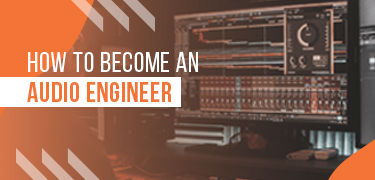How To Become an Audio Engineer
Following the road to becoming an audio engineer opens the door to a dynamic and exciting profession in sound production. Whether you're interested in creating fascinating music, developing immersive soundscapes, or guaranteeing perfect audio quality at live events, being an audio engineer requires a combination of education, hands-on experience, and devotion. This field necessitates technical expertise, artistic flare, and a strong ear for detail. From mastering the complexities of recording and mixing techniques to managing advanced audio equipment, prospective audio engineers begin on a never-ending learning and development path. Joining this thriving sector allows you to design the auditory landscapes of the future and bring music and sound to life in intriguing ways.
Let’s read this blog, which will guide you on how to become a sound engineer, what audio engineers do, and all about audio engineering.


What is an Audio Engineer?
Audio engineers are frequently referred to as sound technicians. They may work for radio or television stations, film or video production firms, or the entertainment industry. They put up audio equipment like microphones and speakers. Before a broadcast or event, audio engineers must ensure that all equipment is in working order. They monitor the devices during the broadcast or event to verify that there is no feedback and that the sound levels are appropriate. Audio engineers may be responsible for executing the necessary repairs when there is an issue with the sound equipment.
Key Responsibilities of a Sound Engineer
Sound engineers ensure audio quality and clarity in various circumstances, including live events and studio recordings. Their responsibilities have various tasks desired to deliver ideal sound experiences:
Sound engineers establish audio gear such as microphones, speakers, and mixing consoles. They guarantee the equipment is properly operating and adjusted for the venue or recording location.
Recording and mixing: Sound engineers at studios manage the recording process, collecting sound sources precisely and clearly. They combine and balance several audio recordings, altering levels, EQ, and effects to improve sound quality.
Sound engineers monitor sound reinforcement devices during live events to ensure the audience receives clear and balanced audio. They work with artists and event organizers to design sound requirements and manage soundchecks and rehearsals.
Troubleshooting and maintenance: Sound engineers evaluate technical flaws in audio equipment and systems and implement solutions as soon as feasible. They also do frequent maintenance to keep the equipment in excellent condition.
Collaboration: Sound engineers collaborate with artists, producers, directors, and other audio industry experts. They understand creative concepts and technological needs, provide knowledge, and help achieve the desired results.
Quality Control: Sound engineers monitor audio quality throughout manufacturing, finding and resolving any issues that may harm the finished output. They verify that the sound satisfies industry standards and customer expectations.
Adaptability and Innovation: Sound engineers must stay current on evolving audio production technology and trends. They modify their tactics and workflows to integrate new tools and methodologies, always aiming for innovation and development.
Sound engineers are in charge of audio production's technical and artistic parts, from setup to execution, delivering excellent sound experiences across various media and venues.
Steps to Become an Audio Engineer
Step 1: Look into Audio Engineering Duties and Education.
Audio engineers, often known as sound engineers, deliver high-quality sound at live events, in recording studios, and via other means such as radio and podcasts. As an audio engineer, one of your key jobs may be to balance the sound of all audio equipment connected during a performance, such as microphones, amplifiers, speakers, and PA systems. You must be technically skilled as an audio engineer and work highly accurately with analog and digital equipment. To become a professional, you must complete an associate's or bachelor's degree.
Step 2: Prepare for an audio engineering education in high school.
If you want to work in audio engineering, the College Board recommends studying electronics, computers, and physics in high school. Also, consider gaining experience in your school's music or drama departments. You may work behind the scenes with sound, video, or lighting.
Step 3: Get an associate's or bachelor's degree.
As an aspiring audio engineer, consider pursuing an associate's or bachelor's degree in audio engineering or production. You may expect to learn about connecting connections, running a mixing board, mixing music and sound effects, positioning microphones, troubleshooting sound difficulties, and mastering procedures. Because so much sound design is done digitally on computers, you must also be proficient in audio software programs like Pro Tools and Logic.
Step 4: Complete an internship.
Aspiring audio engineers may consider earning an associate's or bachelor's degree in audio engineering or production. You may expect to learn how to connect devices, operate a mixing board, mix music and sound effects, place microphones, troubleshoot sound issues, and master techniques. Because so much sound design is done digitally on computers, you should also be familiar with audio software programs such as Pro Tools and Logic.
Step 5: Get a job as an audio engineer.
According to the US Bureau of Labour Statistics (BLS), audio engineers can operate in various locations, including recording studios, athletic stadiums, theatres, movie sets, and music video shoots. The BLS also stated that employment opportunities for sound engineering technicians will likely increase by 17% between May 2020 and May 2030. When looking for work, check job advertisements or utilize the networking services of organizations such as the Audio Engineering Society and the Society of Professional Audio Recording Services.


CATEGORIES
- MBA Program
- Data Science and Analytics
- Cloud Computing
- Data Analytics and Business Intelligence
- AI and Digital Systems
- Cyber Security and Digital Forensics
- Business Analytics & Intelligence
- Banking & Financial Services
- International Business
- Digital Marketing
- Research Paper
- Media & Entertainment
- Media Management
- Journalism and Media Production
- Media & Information Technology
- Visual Communication
- Game Development
- Sound Engineering
- Game Art & Design
- Photography
- Film Making
- Animation & VFX
Are you aspiring to become a proficient Sound Engineering professional?
Look no further; we are committed to nurturing the potential of young minds. Are you ready to enhance your skills?


